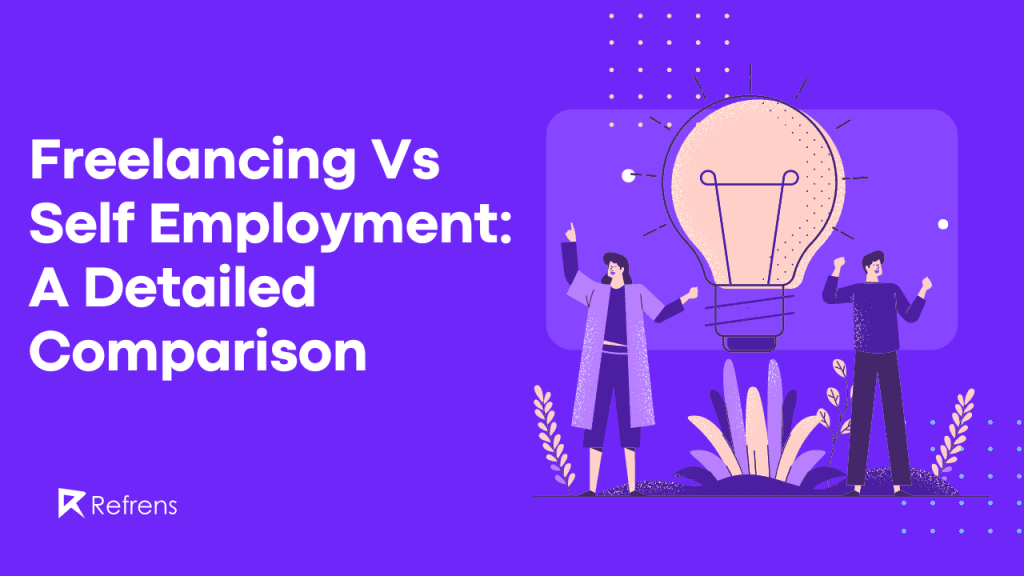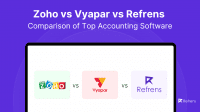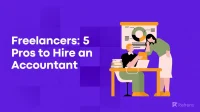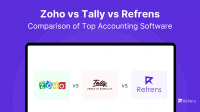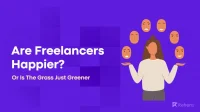“If you are not willing to risk the unusual, you will have to settle for the ordinary.” -Jim Rohn.
People often use the term freelancing and self-employed interchangeably. However, both are entirely different concepts of working. The only similarity between these two is- Freedom to work on your own terms.
Nevertheless, distinguishing between freelancing and self-employment would become pretty tricky when a person is doing contract work for some organization.
That’s why to clear out this cloud of confusion, let’s create a hypothetical situation and have a detailed discussion. So, let’s get started.
Comparison On Freelancing Vs Self Employed
Imagine this:
You are considering visiting Italy and beginning your work journey from there. Accordingly, the key areas of distinction would be as follows:
1. Requirement of Visa
In the case of self-employment, you’d have to either set up your brand name in Italy or invest in an already established firm. Of course, that would be a pretty daunting task. Though, you can consult and apply with Bersani Law Firm&Partners to avail of the investment visa. It will offer you numerous benefits:
- Ease in completing legal formalities and gaining a business license for setting up your brand name.
- Access to Schengen Zone.
- Full EU rights.
- Avail Italian citizenship.
On the other hand, in Italy, an ex-pat has to avail freelance visa in order to work as a freelancer. It is particularly important if they stay for more than three months (limit of traveling visa). It allows you to legally reside in the company without being employed with other firms.
Here’s the catch: If you plan to work for more than six months, you must register as a business and apply for another (investor or not) visa. It is critical as after six months of working in Italy, you’d have to pay taxes.
In essence, self-employment offers better opportunities to you to grow and expand as compared to freelancing.
Recommended Reads: 15 Best Invoicing Software In 2024
2. Working Style
Self-employed individuals and freelancers are less likely to adhere to a standard 9–5 workday. They both have the option to pick their coworkers and have some degree of control over their work schedule.
Freelancers can decide how much or how minimal work they want to do. Self-employed business owners, however, are free to operate their companies however they see fit.
Check out the best place to work as a freelancer.
Nevertheless, the overall working style is quite different.
One might consider a freelancer to be more of a lone wolf. They frequently take on a limited number of clients and set their own hours.
Read more about the modern career choice of millenials.
In contrast, self-employed people are more likely to employ staff to assist them in their endeavors. They must also formulate proper policies and working schedules to manage the set-up. Unlike freelancers, who work on their terms and are less accountable to others.
Check out when to hire a freelancer vs a full-timer.
3. Focus On Growth
Those who are self-employed frequently look to the long term. They tend to stick with one job and make efforts to turn it into a mainstream business with specific office addresses for clients and customers to reach out to set up at one location.
Check out the 5 Success Tips For The Self-Employed.
Whereas freelancers are more prone to move around from job to job. In fact, freelancers tend to take on projects depending on their availability and may indulge in more than one job. For instance, you can be a professional content writer working with an Italian firm while working on small assignments outside of working hours.
In essence, being self-employed implies that you are constantly looking to develop your company. Freelancers, meanwhile, are concentrated on accumulating experience in order to secure larger, better-paying assignments.
4. Clients
Freelancers only have clients instead of customers, which makes them different from self-employed ones as they have both clients and customers.
Despite having differing connotations, the phrases “clients” and “customers” are sometimes used interchangeably.
Simply put, customers hunt for a service or product to buy, whereas clients tend to influence the terms of a contract and have work performed for them.
Freelancers are distinct from the self-employed since they only have clients. They take projects from clients and deliver them as stated in the contract. Whereas self-employment includes both. They work with clients to deliver quality products and services to their target audience (customers).
Recommended Reads: Top 7 Invoice Generator Software
5. Level Of Control
Although both have some degree of independence, their operational scope or degree of control varies. Even though they deliver services to clients in the manner that the client desires, freelancers have the freedom to choose the type of clients they wish to engage with. Nevertheless, when they accept a project or assignment, they finish it in the manner and on the schedule specified by the client.
Check out the 6 signs that freelancing is for you.
Self-employed people have a little bit more influence over this. They have more creative licenses when it comes to the services they provide and the manner in which they provide them. As a result, even if they both have some control, the degree of that control varies.
Recommended Reads: E-invoicing In GST: A Complete Guide
6. Work Commitments
Freelancers generally focus on short-term work commitments. Yes, they do focus on building their network, yet they prefer to enter into customer ties for a shorter period of time. The reason is quite simple, i.e., the purpose of freelancing is to work in your own time and pace with the people you desire. So, they hold temporary projects and positions.
On the flip side, self-employed professionals give their entire attention to their company and the customers who purchase their goods or services. For self-employed individuals, expanding their brand or business is the primary objective. They achieve this by building positive and long-term business and client relationships.
When To Call Yourself A Freelancer
- You have a freelance work visa.
- You have a job in addition to projects.
- To the clients, you are selling your time
- You work by yourself
- You work from home (and don’t have an office).
- You work in the creative industry.
When To Call Yourself A Self-Employed
- You have citizenship.
- You have an office set up (from home or a commercial building).
- You pay for office rent, salaries, and other costs.
- You’ve employed other people or plan to do so.
- Your work is your primary source of income, and you are completely committed to it.
To Sum It All Up
These are the fundamental differences between both. Hopefully, this article will provide you with a clear picture and assist you in making the best decision.

